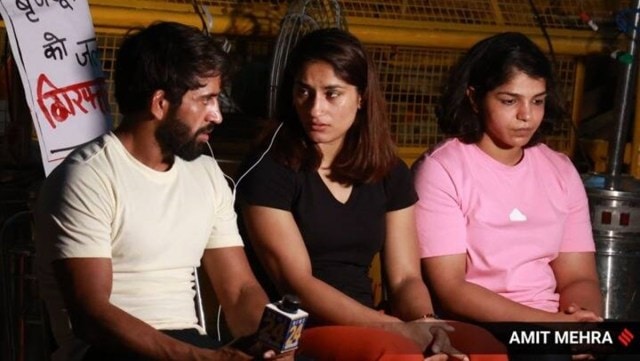
Last year, after winning a gold at the Commonwealth Games, wrestler Vinesh Phogat said she almost quit wrestling after her bad run at the Tokyo Olympics, but encouraging words from Prime Minister Narendra Modi motivated her. “When I was low, I met Modi ji and he gave me motivation. He said ‘we trust you and you can do it’. That reignited the spark in me,” she had said.
Such indeed is the power of a leader you look up to. Their words can fire you up, their expression of trust can strengthen your flailing belief in yourself.
This past week, Vinesh has sought support again. Visuals of the rain-drenched star athlete have been everywhere, in tears after the police action at Jantar Mantar, accompanied by similarly dishevelled medal winners, her voice breaking as she addresses the camera, asking if “this was the day we won medals for”.
This time, no bracing words have come her way so far. Way to drag an idol through the mud.
It is true that after a Supreme Court nudge, due process is being followed in the sexual harassment allegations against Wrestling Federation of India (WFI) president Brij Bhushan Sharan Singh. But the fact remains that it took medal-winning athletes camping on the street and the Supreme Court’s involvement to do what is legally the bare minimum in a sexual harassment complaint.
It is also true that the law takes its course, and its crackdown can’t depend on the emotional heft a complainant wields. But the police have been visibly active against the protesting wrestlers, while no one from the powers that be has made even a token gesture of reaching out to them. Brij Bhushan Sharan Singh, meanwhile, continues to hold his post at the WFI, staying in a decision-making position for those who have complained against him.
It would not have been very difficult for the sports minister or for the women and child development minister to walk up to the protest site, assure the wrestlers of justice, and ask them to go back to their training. That would have been a heartening visual, something to reinforce the nation’s trust in fairness and due process. Instead, we have increasingly besieged-looking athletes saying they are willing to give up their medals and even their lives if that’s what it takes to get justice. When politicians from other parties did go to meet them, Union Minister Meenakshi Lekhi wondered, “…with these discredited people joining in, what more can be said.”
Remember, Vinesh, Sakshi Malik and Bajrang Punia are not protesting for themselves, but are putting their reputations, and potentially, their careers on the line for fellow athletes they allege have been victimised.
The government, spearheaded by the PM himself, has admirably talked of women empowerment consistently. They have spoken about taking inspiration from women who are achievers in their fields. If a little girl had been inspired by the picture of a triumphant Vinesh or Sakshi on the podium, medal around their necks and the Tricolour behind them, one can only wonder what that girl feels now.
What is happening to Vinesh and Sakshi is all too familiar for most women — the fear that if they speak out against a powerful man, they will be mistrusted, belittled, harassed. One would like to hope that achievements and a proven track record are insurances against that. The two women have won medals in wrestling, they are literally among the most skilled fighters in the world. They have made the country proud, the powerful from across fields have celebrated them. If they are reduced to fighting for their dignity on the streets, alone and in tears, what can the average beti hope for?
In an idea exchange with The Indian Express, Vinesh had said, “They took advantage of our situation. They knew we were scared and respected people.” Talking about lack of support, she said, “If we don’t deserve their support in these times of struggle then, god-willing, if we win a medal tomorrow — and we will work very hard for it — then don’t come to congratulate us; don’t say you had faith in our abilities because you didn’t, that’s why you are doubting us now.”
This is again something all too familiar for all women. The knowledge that the oppressor feeds on your fear, that if you do speak up, you are likely to be all alone. That people who so far depended on your skills to get work done will suddenly doubt everything you stand for. And in such moments, one takes courage from successful examples wherever one can find it. The episode playing out at Jantar Mantar right now is likely to teach more girls that speaking out is futile, that it will only open you up to being discredited and ridiculed.
Without commenting on the merits of the case, women speaking up on behalf of other women is inspiring. Vinesh, Sakshi, and the others have shown mettle, saying they can make the necessary sacrifices for what is right. Women across the country, without their star power, continue to display the same mettle, and far too often, pay the price, in the dangal that the quest for justice can be. Now would be a great time to tell those betis that speaking up for their rights is not sehat ke liye hanikarak.